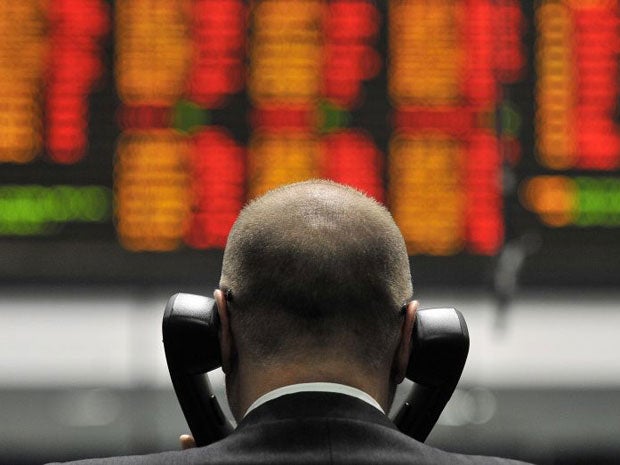
European markets retreated today after the Greek Prime Minister triggered fresh fears over the future of the eurozone with shock plans to hold a referendum on a vital rescue package for the region.
The FTSE 100 Index was more than 3% lower after George Papandreou's unexpected move cast fresh doubts on last week's much-heralded proposals to protect Europe from collapsing into recession.
Elsewhere, the Markit/CIPS purchasing managers' index revealed a decline in the UK manufacturing sector in October, fuelling fears of a double-dip recession and overshadowing better-than-expected GDP figures for the third quarter.
David Jones, chief market strategist at IG Index, said: "The decision by Greece to hold a referendum on the bailout is a shock to investors who thought that we were finally nearing the end. It raises the prospect of the crisis dragging on further still, continuing the uncertainty for stock markets."
The FTSE was more than 120 points lower at 5422.2 while Germany's Dax was 5.2% down and the Cac-40 in France was more than 4.5% lower.
The dismal opening in Europe followed a weak session in Asia where fears over the viability of the three-pronged EU rescue deal and weak Chinese manufacturing data troubled investors.
EU leaders last week agreed with banks a 50% haircut on Greek debt and to boost the eurozone bailout fund to one trillion euro (£870 billion), which follows an earlier decision to shore up banks' finances.
However, Greek leader Mr Papandreou last night threw a spanner in the works when he announced his debt-strapped country will hold a vote on whether to accept the deal next January.
The decision came following large-scale protests in Greece against austerity measures demanded by the European Union but analysts have warned a "No" vote could have a serious knock-on effect.
Jordan Lambert, trader at Spreadex, said: "Considering how persistently Greece and Germany have pushed for this long awaited deal it seems quite unnecessary to risk undoing all the progress to date."
The banking sector was worst hit by today's fresh concerns with Barclays falling nearly 10%, Royal Bank of Scotland losing nearly 8% and Lloyds banking Group dropping nearly 6%.
The Office for National Statistics revealed GDP grew 0.5% between July and September, ahead of City forecasts of around 0.3%, but this did little to cheer traders.
The latest twist to the debt crisis followed growing uncertainty over the aid package, which initially triggered a surge on world markets as traders took hope from the proposals.
The funding of the deal came into question after reports emerged that the Chinese Government may not contribute as much money to the one trillion euro bailout fund as previously hoped.
A raft of weak eurozone data yesterday underlined the challenge facing policymakers who are fighting to solve the crisis.
Stubborn inflation, high unemployment and downgraded forecasts from the Organisation for Economic Co-operation and Development added to the waning optimism.
Meanwhile, international broker MF Global emerged as the first major casualty of the eurozone's debt woes after it filed for bankruptcy protection in the US.
Concerns about the company's holdings of European debt caused its business partners to pull back last week, which led to a severe cash crunch, the company said.
Elsewhere, the China Federation of Logistics and Purchasing said its monthly purchasing managers index fell an unexpectedly large 0.8% to 50.4, just above the 50-level that signifies expansion.
The figures raised fears of a slowdown in Chinese demand and hit the FTSE 100's miners, including copper giant Antofagasta and Anglo-Swiss firm Xstrata.
PA
Subscribe to Independent Premium to bookmark this article
Want to bookmark your favourite articles and stories to read or reference later? Start your Independent Premium subscription today.

Join our commenting forum
Join thought-provoking conversations, follow other Independent readers and see their replies